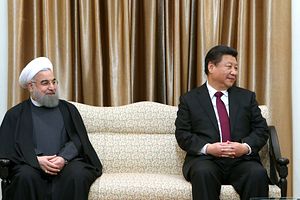Iran’s nuclear deal with the so-called P5+1, the Joint Comprehensive Plan of Action (JCPOA), implemented in January 2016, once fueled many hopes in China that Tehran would become an important pillar for Beijing’s “One Belt, One Road” strategic outline. For most Iranians, the removal of sanctions offers an economic lifeline, a possible end to political pariah status, and re-integration into the global economy. So far, however, very little has changed.
When reformist Hassan Rouhani was elected president in 2013, many Iranians believed that the new president would end the nuclear dispute and fix the Iranian economy through more inbound foreign investment, especially from Western states. However, since 2014, the falling price of oil has caused Iranian GDP, which largely depends on energy profits, to decline.
Iran has the potential to become one of the most influential economies in the world. It is the second largest economy in Middle East (next to Saudi Arabia) and has the second largest population in Middle East (after Egypt). However, Iran’s favorable demographic conditions have not been sufficiently leveraged since the signing of the JCPOA.
The central goal of Rouhani’s government is to attract foreign direct investment (FDI). Rouhani’s administration is seeking to attract Western and Asian states’ capital, technology, and expertise into Iran to help update the country’s oil industries, infrastructure, and electricity supplies. Before the signing of the JCPOA, although Beijing was Tehran’s only reliable economic partner, China-Iran economic ties were still largely limited by international sanctions.
After the JCPOA, China saw a great chance for Chinese capital investment in Iran. On the one hand, China believes Iran should be grateful for Beijing’s long-term insistence on economic cooperation with Iran. Many Chinese experts are proud that Iran’s streets are full of Chinese products–not only small daily necessities, but also cars, mobile phones, and even subway lines. On the other hand, China believes that post-JCPOA, Iran will provide China even more economic chances, opening not only to Chinese produces, but also capital, management experience, or even the “political advice” that represents the “China Model.”
However, China’s economic expansion in Iran faces major obstacles. The foremost is Iran’s political and religious hardliners. The Iranian Revolutionary Guards Corps (IRGC), the conservative clergy, and other political hardline groups have always opposed opening Iran’s market to foreign capital. The clergy elite, and especially the IRGC, which hitherto have enjoyed the benefits of controlling the country’s key industries, have much to lose in a non-sanctioned and non-protectionist Iran. Even the supreme leader, Ali Khamenei, has had to support Rouhani’s reforms and diplomatic efforts cautiously and indirectly. Khamenei himself even put forward the “resistance economy,” which aimed to avoid a substantial inflow of foreign investment.
Resistance from Iran’s hardliners is not the only hurdle facing increased Chinese investment. The United States still maintains unilateral sanctions on Iran. Washington believes that Iran–or at least some groups inside Iran, such as the IRGC–have close relations with terrorist groups in Middle East. U.S. sanctions continue to cut Iran off from American financial markets and dollar-denominated international institutions. By legally preventing major U.S. banks from dealing with the Islamic Republic, the sanctions pose a high risk for foreign companies investing in Iran. This explains the ongoing absence of foreign ventures, especially American ones, in the country.
Although both hardliners in Iran and sanctions from U.S. hamper China’s economic expansion in Iran, the biggest obstacle comes from Iran’s vision of China. On the one hand, China’s “soft power” in the Middle East is limited. China, confined by its own political inertia, is more willing to concentrate its resources on the propaganda managed through inefficient but “loyal” state-owned media and establishments. Iranian youths are better educated and politically more liberal; they are more willing to accept the West’s political and social culture rather than the Chinese Communism’s lack of political freedom and openness. Iran’s vision of China is largely limited to economic power; Beijing is not viewed as an attractive model for Middle East.
On the other hand, Iranians are proud of their own culture and abundant natural resources. Contrary to China’s belief that Iran should “thank” China for Beijing’s continuous economic partnership, even in the face of international sanctions, most Iranians believe China should be grateful to Iran for continuously offering natural resources such as oil and gas to the Chinese market. Similar to other developing states, Iran still views Chinese products as “cheap” and “low-quality”; Iranians show little trust and interest in China’s growing management expertise and cutting-edge technology. As an ambitious power in Middle East, Iran hopes to diversify its economic cooperation with different foreign states, and China should not be the only option.
With Iran’s presidential election coming in 2017, Rouhani’s fate may significantly influence Tehran’s desire to attract foreign investment. However, even if Rouhani hangs on and the domestic marketing environment becomes more open for foreign investment, China should not overestimate its influence and economic chances in Iran.
Wang Jin is a PhD candidate at the School of Political Science, University Haifa, Israel.
Zhao Xinghua is a PhD candidate at the Middle East Studies Institute, Shanghai International Studies University, China.

































